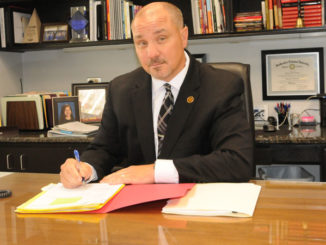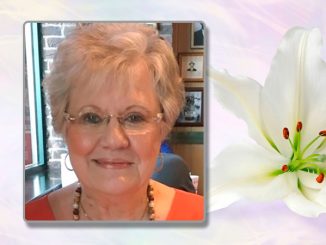
Tony Clayton, a special prosecutor for the 18th Judicial District Court, is considering a run for governor as speculation grows about the impact an African-American Democrat would have on the early, all-white field.
“I’m a conservative Democrat,” he told LaPolitics. “I believe in smaller government, I’m pro-life and I’m for traditional marriage. I hunt, and I believe in the second amendment. I also think our oil companies play an important role in Louisiana and I don’t think we should be trying to run them out of the state.”
Clayton would be a big personality in a big race and a poll is expected to be in the field soon to test his name statewide.
The Port Allen resident is already well known in the greater Baton Rouge area for having prosecuted serial killer Derrick Todd Lee and later co-authoring “I’ve Been Watching You” about his experiences. He’s also the former chairman and a current member of the Southern University Board of Supervisors.
Clayton said he has always had a passion for public service, but did not take the race for governor seriously until donors and supporters started encouraging him to qualify. “I’m flattered and it’s something I’m talking to my wife and family about,” he said.
Prosecutor joins general as wildcards
Clayton now shares the most prominent question mark in the race with retired Army Lt. Gen. Russel Honoré, who has no party affiliation. Honoré told LaPolitics earlier this month that he was still undecided, but hinted his candidacy was a real possibility.
Played out on the back of an envelope, their entry into the race, either separately or together, would do little to frontrunner U.S. Sen. David Vitter in the primary, analysts say. But it could reopen the runoff scenario and shake up the rest of the field, beginning with state Rep. John Bel Edwards of Amite, so far the only Democrat polled with a seemingly secure spot in the runoff.
Honoré is nowhere near as moderate as Edwards and he would cut Edwards off at the far left, whereas Clayton may want to compete against the state rep for part of the party’s base.
“I don’t believe that John Bel Edwards has a lock on black Democrats,” Clayton said. “I believe that they are going to vote intelligently. Even if I don’t run, I’ve never supported John Bel Edwards in the past and he won’t be one of my candidates.”
Edward did not respond to a request for comment.
If Honoré can somehow galvanize the state’s 737,000 no-party voters, and Clayton gets in alongside the general, the question then becomes how does it affect the other established Republicans.
Clayton, though friends with Lt. Gov. Jay Dardenne, might eat into his black support in the Baton Rouge region, providing some benefit to Public Service Commissioner Scott Angelle. But it may not be enough to deter from Dardenne’s strong third place showing in recent polls, which may allow him to climb even higher if Edwards’ share of the vote drops as a result.
Additionally, Honoré, as an environmental justice candidate, probably wouldn’t shy away from going after Angelle’s close relationship to oil and gas.
Vitter maintains lead on paper
For Vitter, an all-GOP runoff is less preferable to a classic R vs. D showdown. That’s why the pro-Vitter Fund For Louisiana’s Future super PAC may, sooner than later, start propping up Edwards’ candidacy. The super PAC, which cannot coordinate activities with campaigns and candidates, has already sent an email out offering supportive words for Edwards.
Historic gubernatorial election patterns, which tend to favor underdogs, may not necessarily bode well for Vitter, but the latest poll from Southern Media and Opinion Research shows he would be the heavy favorite if the race were held today.
He leads the field with 38 percent, followed by Edwards, 24 percent; Dardenne, 16 percent; Angelle, 5 percent; and undecided, 15 percent.
It’s a bump up from the low to mid 30s for Vitter, after a string of high-profile endorsements and no real money spent in the field or on TV. He dominates nearly every line in the cross-tabs, with only a few questionable stats.
How the polling breaks down
Vitter tops Dardenne in the Baton Rouge-anchored 6th Congressional District, 30-25, soaking up the hard-right vote in the capital region, which has likely been bolstered by his opposition stance to Common Core compared to Dardenne’s support. The case for Vitter is less so in the broader Florida and River parishes, 25-24, but with a +/- 4 percent margin of error Dardenne is definitely in the fight on his home turf.
The margin of error could be used in the trial heat as well to take Edwards down four points and Dardenne up four — and suddenly there’s a two-way race for second place. Such is the case with polls and campaigns; who benefits depends on who you ask.
Vitter surprisingly bests Edwards in the New Orleans-based 2nd Congressional District, barely, 33-32, which the margin of error could sway. But it appears tight on the page.
If anything, Vitter may be over-polling with black voters, carrying 16 percent to Edwards’ 52 percent, and 6 percent to 59 percent among black Democrats. Vitter will surely lose numbers in this area and Edwards will gain. But it’s a portion of the electorate that Dardenne, especially, and Angelle are working to gain ground with.
In every comparison possible, Vitter has a 15- or 16-point gender gap between male and female voters. He runs so solidly among white males, with 55 percent, that it may not matter, said SMOR partner Bernie Pinsonat. But the goal of his opponents has to be to widen the gap and strengthen female support for their campaigns.
Vitter elbows out Angelle in the 3rd District, 36-13, and in the broader Acadiana region, 35-13, which is an area the senior senator has always run slightly better in than his home base of Jefferson-Orleans.
Vitter actually performs best in wide open north Louisiana, where no candidate has surfaced. He carried 46 percent of the piney north region in the poll, 52 percent of the 4th District and 35 percent of the 5th District.
The SMOR poll used 600 samples collected May 5-9. A group of subscribers paid for the annual poll, each putting up no more than $2,000 and having no input or advance knowledge of the poll questions, according to Pinsonat.





Be the first to comment